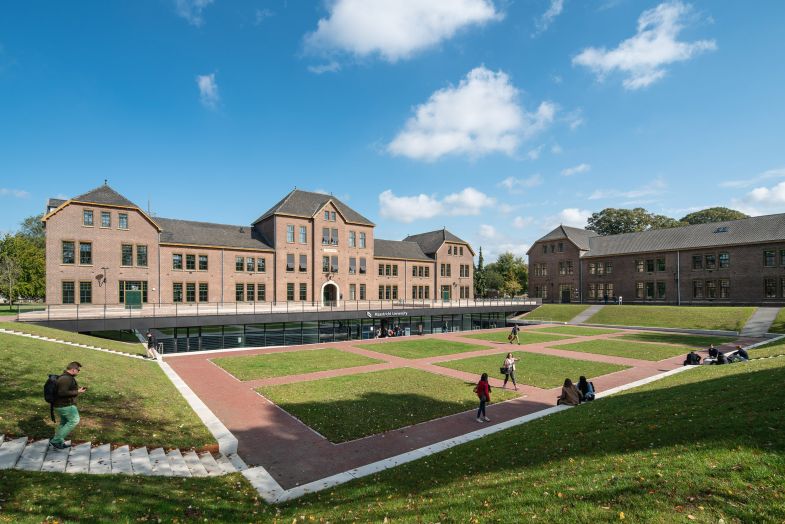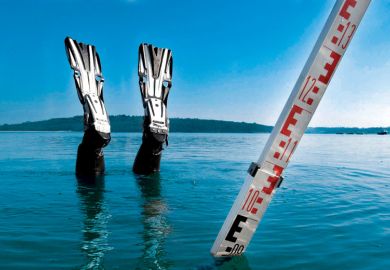In a parallel universe Rianne Letschert would be working at an NGO. Six years ago, at 39 years old, the legal scholar contemplated quitting academia due to what she saw as a deplorable lack of diverse career paths in higher education.
Instead, the single mother of two climbed her way to the top job at Maastricht University in the Netherlands to make the changes she wanted to see.
Like a landscape gardener, Letschert is reshaping the terrain of higher education careers, forging new pathways for promotion and, for many, opening up the vista in the Netherlands and beyond.
The rector is leading a project via the Dutch Association of Universities (VSNU) – which unites the leaders of all 14 higher education institutions in the Netherlands – to radically alter how academics are assessed and promoted.
Named “Recognition and Rewards”, the programme will bolster career paths for academics who excel in areas other than research; namely education, societal impact, and leadership (as well as patient care for medical staff).
In the latest in our Talking Leadership series, Times Higher Education speaks to Letschert about the successes of the programme so far, dealing with a rebellion from a Nobel prizewinner, and why she thinks the initiative could help stop scandals in academia.
‘You’re fired’
It was when she was the director of an institute that the seed of the idea for change first took hold, as Letschert “had to fire everyone every so many years”.
“If they didn’t have a grant, they would get fired immediately, because I could not fund them any more. And the people that had other skills, we needed them but [they had] no career possibilities,” she says.
“I saw so many people getting frustrated, who were doing wonderful things for the university…for those people, it was hardly possible to grow because their research track was not comparable to those who focus merely on research. I thought, why are we doing this? We’re losing so much potential.”
When Letschert first stepped up to the top job at Maastricht she quickly threw down the gauntlet to the VSNU – “it was the reason why I wanted to be rector in the first place” – outlining her vision for change, but expecting a lot of resistance from the other university leaders. She found support.
“There were more people like me that were fed up with the way that we treated our staff members,” she says.
The big kick-off for Recognition and Rewards was in 2019 when VSNU launched a position paper in collaboration with the large Dutch funding agencies. It laid out plans to modernise the system of rewards by recognising excellence in the key areas, giving more recognition to teamwork, emphasising quality over quantitative results (such as number of publications) and encouraging leadership development. Since that publication each university has gone away and piloted their own version of the plan.
At Maastricht, Letschert has charged working groups with formulating what it means to be excellent in teaching, impact, research and leadership. These are still in development, but they have already started using the new criteria to promote people.
Letschert gives the example of an assistant professor of law who excels in innovative teaching methods: “His passion is not to write more law articles in legal journals. His passion is to build the best education for the law school.” Under the old system this meant he would never progress beyond assistant professor, but in the latest round of annual assessment interviews his creative approach to education was recognised and he is now associate professor.
Rebellion
It has not all gone smoothly, however. In July 2021, a group of 171 scientists, including 142 professors and Nobel laureate Ben Feringa, signed an open letter warning that the new recognition system would harm Dutch science. It was published on the Dutch higher education website Science Guide as well as in a national newspaper. They argued that it would create average researchers, “lead to more arbitrariness and less quality” and have “major consequences for the international recognition and appreciation of Dutch scientists”.
That, Letschert says, is a myth.
“We don’t want people not to be able to focus on research any more, but you can also focus on education, if that’s your talent,” she says.
“The one that wants to go for the Nobel Prize in economics can still do that. If that’s your goal in life, go for it, but give other people also some place in the spotlight.”
She is clear that while they do want to incorporate more qualitative assessment, the aim is not to drop quantitative measures, such as the h-index.
Far from being dismayed by the negative publicity, Letschert says it was a good thing: “If [negative feedback is] all hidden, I cannot react. So, the more open critique, the better.”
She believes it showed the academic community was taking the changes seriously, and she was delighted when several younger academics responded defending the new system.
While she has little truck with the weakening research argument, another criticism provokes concern. Academics who want an international career are worried they may struggle to translate their new CVs to other countries.
To this end, Letschert is doing what she can to spread the word internationally. While there are movements elsewhere to change the academic rewards culture – thousands have signed the San Francisco Declaration on Research Assessment (Dora) since it was drawn up in 2012 – change will not happen overnight, and the solution to this is not clear.

Avoiding scandal
Using the new system to develop higher education leaders is an area Letschert is especially passionate about.
“For so many decades we have totally ignored leadership development at universities. We just expect everyone to be a good leader,” she says.
Previously at Maastricht, associate deans could only be chosen from the small pool of full professors. Now assistant professors can be deans if they have the right management skills.
Letschert doesn’t believe the assumption that those who are good at research will automatically be good leaders is the correct one; in fact, she thinks it’s dangerous.
“We’ve had several situations at universities all over the world where things happen that are really not acceptable, but we just let them happen because the person is a great researcher and is so respected…misuse or abuse of power, intimidation, biases in selections, we all know it,” she says.
“I don’t even blame our academic leaders because they were never asked to develop in that regard. It was something you just had to do on top of your work as a researcher and a teacher.”
The new approach to developing leaders will not only mitigate abuse of power, she says, it will also reward the academics who take on more of the work that often goes unnoticed.
She has seen male colleagues achieve senior positions, despite it being mainly female colleagues “having the real academic citizenship attitudes”, she says.
“These female colleagues were not growing in their academic career or in their managerial career. But they were doing all the work.”
The nation and beyond
While Dutch universities are piloting different approaches now, Letschert is firm that the next step must be agreement on a common national framework.
“There should be consensus on the main principles, because otherwise it becomes a random programme. It depends on where you work, and who your manager is,” she says.
For Letschert herself, the future is unclear. She has been rector since 2016, and has recently been appointed president at Maastricht, a position she will have for four years. After that, she says she may well make that move to an NGO, leaving Dutch academia with a radically altered landscape.
Quick facts
Born: Doetinchem, 1976
Academic qualifications: BA in law from the University of Amsterdam; LLM in law and PhD in international law from Tilburg University
Lives with: Her two children, who are 10 and 14 years old
Academic hero: Hannah Arendt, “a philosopher who wrote a lot about the Holocaust”
This is part of our “Talking leadership” series of 50 interviews over 50 weeks with the people running the world’s top universities about how they solve common strategic issues and implement change. Follow the series here.
View the THE Young University Rankings 2022 results
POSTSCRIPT:
Print headline: ‘We’re losing so much potential’: recognising talent beyond research
Register to continue
Why register?
- Registration is free and only takes a moment
- Once registered, you can read 3 articles a month
- Sign up for our newsletter
Subscribe
Or subscribe for unlimited access to:
- Unlimited access to news, views, insights & reviews
- Digital editions
- Digital access to THE’s university and college rankings analysis
Already registered or a current subscriber?








